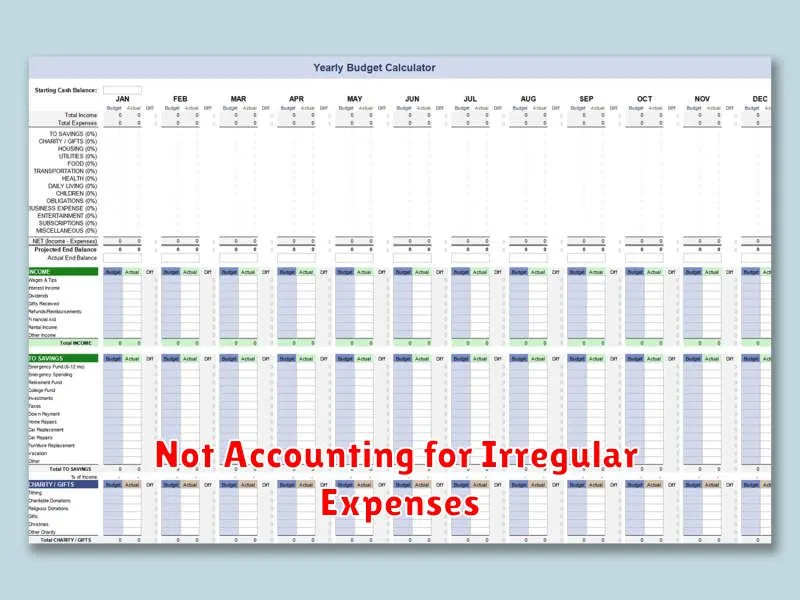Are you making simple budgeting mistakes that are silently draining your finances? Many people unknowingly fall into common budgeting traps, leading to significant financial setbacks over time. These seemingly minor errors can accumulate, resulting in substantial lost savings and hindering your ability to achieve your long-term financial goals. This article will expose the most frequent budgeting errors, providing you with the knowledge and tools to avoid costly pitfalls and build a healthier financial future.
From neglecting to track spending habits to underestimating monthly expenses, these common budgeting mistakes can quickly derail even the most meticulously planned budgets. Understanding these financial pitfalls and learning how to effectively manage your money is crucial for achieving financial stability and building a secure financial future. Discover how correcting these budgeting errors can unlock significant financial growth and pave the way for financial success. Let’s delve into the budgeting mistakes that could be costing you dearly.
Not Accounting for Irregular Expenses

One of the most common budgeting mistakes is failing to account for irregular expenses. These are costs that don’t occur on a regular monthly basis, but still significantly impact your finances. Examples include car repairs, medical bills, holiday spending, and home maintenance.
Many people create budgets based solely on their monthly recurring expenses, such as rent, utilities, and loan payments. While this provides a foundational understanding of regular outgoings, it leaves a crucial gap: the unpredictable but inevitable irregular costs. When these unexpected expenses arise, they can throw your carefully crafted budget into disarray, potentially leading to overspending and debt accumulation.
To avoid this, it’s vital to proactively plan for irregular expenses. One effective strategy is to create a separate savings account specifically designated for these unpredictable costs. Regularly contributing even small amounts to this fund can significantly reduce the financial burden when an unexpected expense arises. Alternatively, you could build a contingency buffer into your monthly budget, allocating a specific amount each month to cover potential irregular expenses.
Accurate forecasting of irregular expenses is challenging, but you can improve your estimations by analyzing your past spending habits. Review your bank statements and credit card records to identify the frequency and average cost of these expenses. This will give you a more realistic picture and allow you to plan more effectively.
Ignoring irregular expenses in your budget planning leads to a false sense of financial security. Addressing this oversight is key to creating a truly sustainable and resilient budget.
Treating Savings as Optional
One of the most common and damaging budgeting mistakes is treating savings as an optional expense, rather than a non-negotiable priority. Many individuals prioritize spending on immediate wants and needs, leaving savings as an afterthought—if it’s considered at all.
This approach is fundamentally flawed. While it might feel freeing in the short term to spend every available dollar, it leaves you dangerously vulnerable to unexpected financial emergencies, such as job loss, medical bills, or car repairs. These unexpected costs can quickly derail your finances and create significant stress.
Furthermore, failing to save consistently prevents you from achieving long-term financial goals, such as buying a home, funding retirement, or paying for your children’s education. The longer you delay saving, the more difficult it becomes to reach these goals, often requiring even greater sacrifices later in life.
Instead of viewing savings as something you can cut back on when times are tight, it should be integrated as a fixed expense within your budget. This means allocating a specific amount each month to your savings account before addressing discretionary spending. Even small, consistent contributions can accumulate significantly over time due to the power of compound interest.
Prioritizing savings is not about deprivation; it’s about securing your financial future and building a foundation for stability. By making savings a non-negotiable part of your budget, you are investing in your long-term well-being and significantly reducing your financial vulnerability.
Overcomplicating Budget Categories
One common mistake people make when budgeting is creating overly specific and numerous budget categories. While detailed tracking can seem helpful, it often leads to confusion and inaccurate record-keeping. Instead of having separate categories for “groceries,” “eating out,” “coffee,” and “snacks,” consider consolidating these under a broader category like “Food and Beverages.”
The more categories you have, the more likely you are to make errors in assigning expenses. This can result in a skewed perception of your spending habits and make it more difficult to identify areas where you could potentially save money. Simplicity is key; fewer categories mean less time spent meticulously tracking every transaction, and a clearer understanding of your overall finances.
Another pitfall of excessive categorization is the difficulty in sticking to your budget. If you have too many categories, you may find yourself struggling to stay organized and ultimately giving up on the budgeting process altogether. A streamlined approach, with fewer, more inclusive categories, fosters better adherence and makes budget management far more manageable.
Focus on the major expense areas in your life and group related expenses together. This will provide you with a clearer, more accurate picture of your financial health without the overwhelming complexity of numerous, granular budget categories. Remember, the goal of budgeting is to gain control of your finances, not to create an unnecessarily complicated system.
Ignoring Small Daily Purchases

One of the most common, yet easily avoidable, budgeting mistakes is overlooking those seemingly insignificant daily purchases. A coffee here, a pastry there, a spontaneous purchase at the convenience store – these small expenditures may appear inconsequential individually. However, they accumulate rapidly, significantly impacting your overall budget over time.
The cumulative effect of these small expenses is often underestimated. Consider this: a daily $5 coffee adds up to $150 per month, or $1800 annually. This seemingly small amount can represent a substantial portion of your monthly budget, potentially delaying the achievement of your financial goals, like saving for a down payment on a house or paying off debt.
To combat this, it’s crucial to develop a heightened awareness of your spending habits. Track your daily purchases, even the smallest ones, using a budgeting app or a simple spreadsheet. This will provide a clear picture of where your money is actually going, enabling you to identify areas where you can make conscious reductions. Small changes, like brewing coffee at home instead of buying it daily, can lead to substantial savings over time.
Another effective strategy is to set a daily spending limit for non-essential items. By adhering to this limit, you’ll be actively preventing impulsive buys and keeping your daily spending in check. Remember, consistent small savings add up to significant amounts over the long term.
Failing to Review Your Budget Monthly
One of the most common, yet easily avoidable, budgeting mistakes is failing to review your budget on a monthly basis. Many people create a budget, meticulously planning their income and expenses, but then neglect to check in on its performance. This oversight can lead to significant financial problems down the line.
Regular monthly reviews are crucial for several reasons. First, it allows you to track your actual spending against your budgeted amounts. This reveals any areas where you might be overspending or underspending. Identifying these discrepancies early allows you to make necessary adjustments and prevent them from snowballing into larger issues.
Second, a monthly review helps you stay accountable to your financial goals. Seeing the actual numbers laid out before you provides a clear picture of your financial health and progress. This process of regular assessment keeps you engaged and motivated to stay within your budget.
Finally, reviewing your budget monthly offers an opportunity to identify unexpected expenses and plan accordingly. Life throws curveballs, and unforeseen costs can quickly derail even the best-laid financial plans. By reviewing your budget regularly, you can proactively adjust your spending habits and avoid accumulating debt.
In short, neglecting monthly budget reviews is a significant error with potentially serious consequences. The effort involved in regular monitoring is minimal compared to the potential financial damage caused by ignoring this vital step in responsible financial management.
Comparing Your Finances to Others

One of the most common, yet damaging, budgeting mistakes is comparing your financial situation to others. Social media, in particular, often presents a skewed and unrealistic view of financial success. Seeing others flaunting luxury goods or seemingly effortless wealth can create feelings of inadequacy and pressure to keep up, leading to impulsive spending and unnecessary debt.
It’s crucial to remember that what you see online is often carefully curated and doesn’t reflect the full financial picture. Many people portray an image of affluence that doesn’t match their actual financial reality. Focusing on others’ perceived success only distracts from your own progress and financial goals. Instead of engaging in such comparisons, concentrate on your own journey and celebrate your personal milestones.
Your financial situation is unique and depends on various factors, including your income, expenses, debt, and savings goals. Comparing yourself to someone with a different background, career path, or risk tolerance is unproductive and ultimately unhelpful. What works for one person might not be suitable or even feasible for you. Adopting a realistic and personalized budgeting plan is far more effective than chasing an unrealistic comparison.
Instead of constantly evaluating yourself against others, focus on improving your own financial literacy and setting achievable financial goals. This might involve tracking your spending, creating a realistic budget, building an emergency fund, or paying down debt. By focusing on your own financial well-being and celebrating your achievements, you’ll experience far greater satisfaction and success than through meaningless comparisons.

